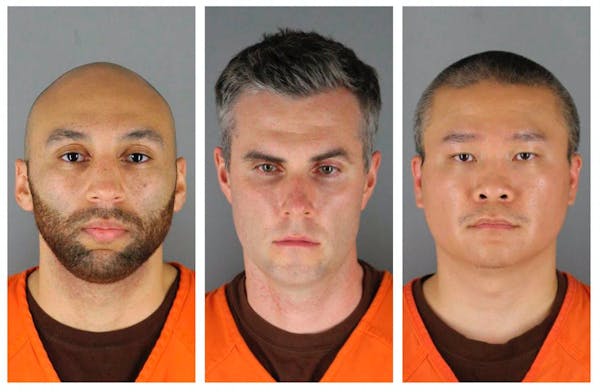Police are obligated to intervene if a colleague uses unnecessary force or puts someone in danger, a Minneapolis police inspector and longtime academy instructor testified Thursday in the St. Paul federal trial of three ex-Minneapolis officers in the death of George Floyd.
Inspector Katie Blackwell was the first Minneapolis police officer to testify in the civil rights trial of Tou Thao, J. Alexander Kueng and Thomas Lane, who stand accused of ignoring their duty to provide aid while fellow officer Derek Chauvin knelt on Floyd's neck for more than nine minutes as he pleaded for his life before falling unconscious and dying in May 2020.
Blackwell said the department put an official policy in place in 2016 establishing the duty to intervene, which includes a "medical component" mandating officers prioritize "sanctity of life" in all circumstances.
"If you're taking somebody into custody, whether for life-saving purposes or for violating the law," it's up to the officers to do "everything we can to protect that person," said Blackwell, who is the former training commander for the entire department.
"Many officers have done it before this policy even became a policy," she said of the duty to intervene.
Police training is at the heart of the case on both sides. In his opening statement, Kueng's defense attorney, Thomas Plunkett, said the department failed to adequately train his rookie client, especially when it came to intervention, which he likened to a word on a PowerPoint presentation.
Under questioning from Assistant U.S. Attorney LeeAnn Bell, Blackwell spent the morning describing the extensive training officers must undergo, far beyond what the state's Peace Officer Standards and Training (POST) Board requires, before being sworn in at the Minneapolis Police Department.
"In the academy, we're trying to create leaders – not followers," said Blackwell, who is now the inspector for the department's Fifth Precinct.
In her testimony, she discussed the use-of-force continuum, which begins with police presence, and can escalate to deadly force. Calls can be dynamic, Blackwell said, adding that force can be escalated quickly, but officers must constantly adjust.
"We teach our officers to use the lowest level of force necessary to detain somebody," she said. "Once we gain compliance, then the force stops."
In the afternoon session, Dr. Bradford Wankhede Langenfeld testified about how paramedics brought Floyd into the emergency room at HCMC at 8:55 p.m. May 25, 2020.
Langenfeld said a team of doctors and nurses prepared the stabilization room for Floyd's arrival when paramedics reported they were bringing in an unidentified man from police custody who was in cardiac arrest. Floyd did not have a pulse when he arrived at the hospital.
The doctor said time is critical for a patient in cardiac arrest because any minute of delay in starting CPR decreases the chances of survival by 10 to 15%. Paramedics told him no one had begun CPR on Floyd before they arrived and began treating him, he testified.
Lane's attorney, Earl Gray, asked on cross-examination if consuming fentanyl and methamphetamine combined with a struggle or wrestling could cause cardiac arrest. Gray was referring to drugs listed in the toxicology report from Floyd's autopsy, which has yet to be discussed in the trial.
"It's possible," Langenfeld said, but added there were "a lot of variables there."
Thao's attorney, Robert Paule, asked Langenfeld about "excited delirium," a controversial diagnosis usually referring to a buildup of acidosis in the blood stream.
Langenfeld said he didn't believe Floyd's acidosis levels could have caused cardiac arrest, but he said his job was to try to treat the patient, not to find the cause of death.
Asked why excited delirium is considered a controversial diagnosis, Langenfeld said there are concerns about bias. He said the diagnosis is used almost exclusively by law enforcement when they're restraining people of color.
Langenfeld said he has seen patients he thought to be suffering from excited delirium. Under direct questioning and cross-examination, he described them as sometimes delirious, sweaty, erratic, unable to de-escalate and sometimes clawing at their own skin.
Court was adjourned after Langenfeld was dismissed. Blackwell was expected to resume her testimony Friday.

Meet the West Sider taking the helm at Neighborhood House, helping new arrivals find a better life
Robbinsdale shelter-in-place alert accidentally sent countywide
Developer of St. Paul's Keg & Case food hall declares bankruptcy

Wildlife agency: Sturgeon won't go on endangered species list

